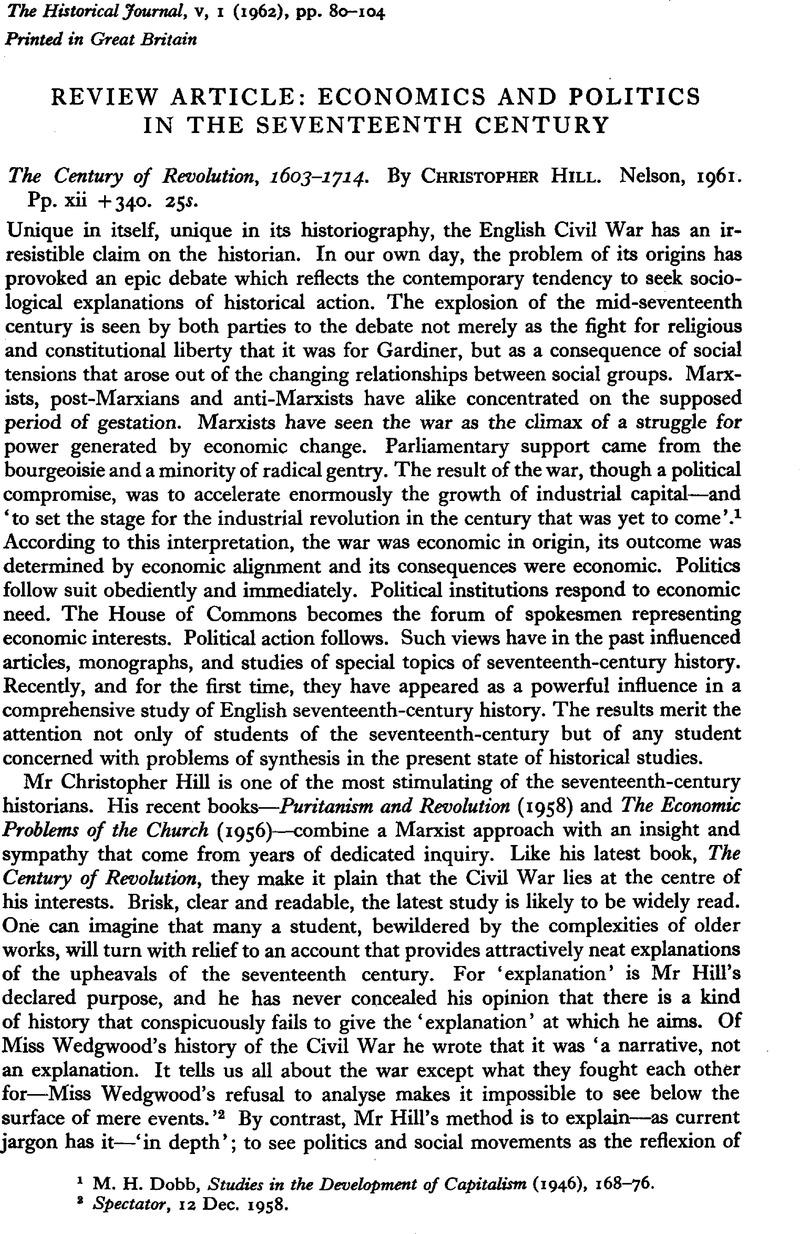No CrossRef data available.
Article contents
Economics and Politics in the Seventeenth Century
Published online by Cambridge University Press: 11 February 2009
Abstract

- Type
- Review Article
- Information
- Copyright
- Copyright © Cambridge University Press 1962
References
1 Dobb, M. H., Studies in the Development of Capitalism (1946), 168–76.Google Scholar
2 Spectator, 12 Dec 1958.
3 See Markham, C. R., A Life of the Great Lord Fairfax (1870).Google Scholar
4 Wedgwood, , The King's War (1958), 87Google Scholar; Warburton, E., Memoirs of Prince Rupert (1849), I, 301–3.Google Scholar
5 Warburton, , 311–12 and n. 2.Google Scholar
6 Burne, A. H. and Young, P., The Great Civil War (1959), 33.Google Scholar
7 Ibid. 120.
8 Ibid.
9 Trevelyan, G. M., England under the Stuarts (1904).Google Scholar
10 Burne, and Young, , op. cit. 224.Google Scholar
11 Ibid. 228–9.
12 Ibid., preface, xiii.
13 Burne, and Young, , op. cit. 105.Google Scholar
14 Wedgwood, C. V., The King's War (1958), 265.Google Scholar
15 Burne, and Young, , op. cit. 8–9.Google Scholar
16 Warburton, , I, 317–31.Google Scholar
17 Wedgwood, , op. cit. 450.Google Scholar
18 Burne, and Young, , op. cit. 207.Google Scholar
19 Warburton, , I, 306.Google Scholar
20 Warburton, , II, 299–300.Google Scholar
21 Ibid. 415.
22 Burne and Young, op. cit. ch. 12. The evidence for the story is not strong. It may have come from the Scots after they were infuriated by Independent claims that the victory was theirs.
23 Studies in the Development of Capitalism (1946), 168 ff.
24 Price, J. M., The Tobacco Adventure to Russia (Trans American Philosophical Society, 1961)Google Scholar; Letwin, W., Sir Josiah Child, Merchant Economist (Harvard, 1959).Google Scholar
25 Supple, B. E., Commercial Crisis and Change in England 1600–1642 (Cambridge, 1959).Google Scholar
26 Op. cit. 164.
27 Letwin, op. cit.
28 See Wedgwood, op. cit. 12, for a statement of the case for the narrative method.
29 MrWoolrych's, A.Battles of the English Civil War (1961)Google Scholar appeared too late to be considered here. A trifle harsh on Rupert, it conveys eloquently the real suspense of the war: in every respect an admirable corrective to determinism.


